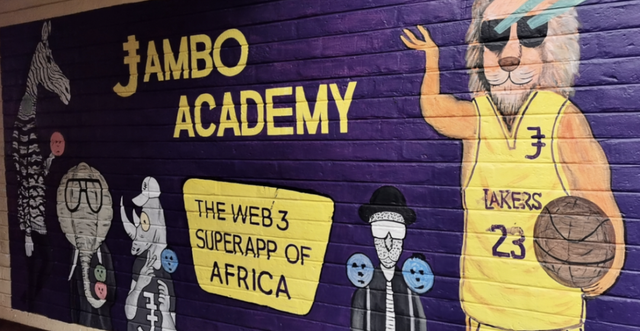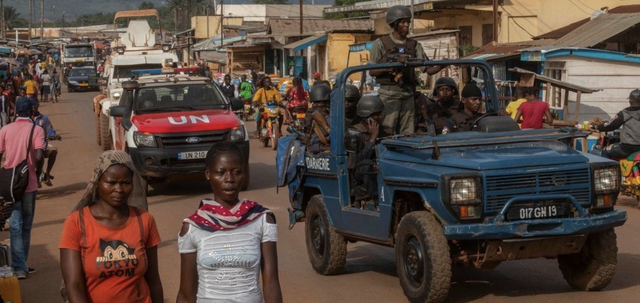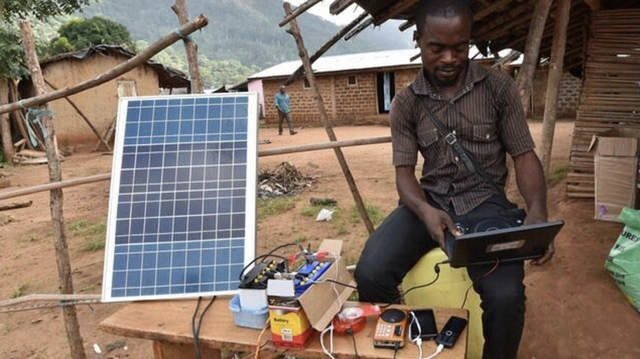“Africa will be richer than Western countries.” – Charles Hoskinson, co-founder of Ethereum and founder of the public chain Cardano, made this amazing conclusion not long ago.
He said that Africa is surpassing the United States and Europe in accepting blockchain technology, and African countries can bypass the centralized infrastructure dominated by the West, rebuild their economic infrastructure, and directly enter the “next generation Internet” – “becoming a Web3 leader.”
This may be an exaggeration, but it is an indisputable fact: according to data from Chainalysis, in the past year, the market value of the African cryptocurrency market has increased by 1,200%, and Kenya has led the world in Defi trading volume for the second consecutive year. Johnny Lyu, CEO of cryptocurrency exchange KuCoin, believes that Africa’s cryptocurrency adoption rate has surpassed the United States, Europe and Asia to become the world’s first .
At present, the United States, Singapore and other regions are the gathering places for Web3 talents, but Africa, which lacks technical talents and is economically backward, shows the strong momentum of the rise of the Web3 wave.
“It’s a big contrast, the Web3 industry is like this, I’m used to it,” a headhunter doing global recruitment business told Geekpark (ID: geekpark) that he found that Web3 jobs from Africa, Southeast Asia, Brazil and other regions Recruitment demand is indeed growing faster. “These countries seem to be a bit far from the technology powerhouses.”
We tried to analyze the unique situation of Web3 development in Africa. By presenting the development path and experience of Web3 in Africa, it may provide inspiration to practitioners of Web3 and other industries.
01 Web3 Propaganda: Putting money first
The Web3 projects that have landed in Africa have a common feature: they all have a “money flavor”. They are not like other Web3 projects, to constantly promote their great “decentralization” dream, or outline the “big cake” of the next Internet revolution.
On the contrary, they will tell the user very bluntly: Use my product to make money.
For example, James Zhang, founder of Jambo, an African Web3 app launched in 2021, said bluntly in an interview with TechCrunch, “Every feature in our app is designed to help ordinary people make money.”
Investors are so impressed with its grounded strategy that after securing a $7.5 million seed round in February this year, Jambo raised another $30 million in Series A financing in May.

Jambo’s wall-painting ad | TechCrunch
The service currently provided by Jambo is that users can make money (tokens) by watching videos – this is similar to the way China’s previous short video products opened up the “sinking market”, by watching videos and accumulating time to get red envelope rewards; and, using Jambo’s APP can save data charges, similar to the data cards that Chinese Internet companies have launched.
For Chinese users, its gameplay is not new, but it hits the “crucial point” of African users. In Africa, data is expensive, making voice calls and watching videos with data are very luxurious things. Therefore, Jambo used the “half-price traffic discount” to attract users: by cooperating with local telecom companies, it purchased traffic at a 70% discount, and then sold it to users at a 50% discount of the original cost. “This is our way of acquiring users. one.”
Jambo is equivalent to a content aggregation platform, and its profit model is also very simple. It cooperates with other social media to obtain content and distributes it to users to earn advertising fees and commissions. In addition, James Zhang revealed that they are also testing more than 10 games in the play to earn mode.
More straightforward than Jambo, Cassava, a Web3 company established in 2021, has already revealed its intentions in its name. Cassava (cassava) is a tropical and subtropical plant that 800 million people around the world rely on as their main source of nutrition, and the Cassava team says, “is a symbol of a sustainable way of earning.”
Cassava completed a $8 million financing from 40 investment institutions in May. In the plan, it will be a cryptocurrency reward system. Cassava is not to compete for users from the Web2 platform to the blockchain-based Web3 platform. , but to introduce its functionality into Web2 applications.

Bangui, the capital of the Central African Republic|Official website of the United Nations
According to Odaily Planet Daily, Cassava has established partnerships with some music, e-books, information and other apps in Africa. Apps that use the Cassava reward system may incentivize users to watch, share and other behaviors, in order to attract More users, and users can get token rewards.
Money has become the magic weapon of choice for African Web3 companies to open up a situation. The background of this choice is: 33 of the 47 poorest countries in the world are in Africa. Unemployment among young Africans ranges from 25% to 60%, and a family of 15 may only have 3 people working. Therefore, it is not important for African users whether those Web3 applications are interesting and easy to use, and it is essential to earn some income to maintain daily life.
The case of Africa provides a new revelation. Web3 applications do not need to completely subvert the application scenarios of web2. For example, Cassava and Jambo have entered people’s daily life with an idea of assisting and improving Web2 applications.
“What attracts users is the product itself, not the technology. A good product should be a combination of Web2 and Web3.0 technologies. What everyone cares about is assets and important data, not every data needs to be placed on the blockchain.” Andrew, who has worked in the field of financial technology for 10 years and turned into a Web3 entrepreneur last year, told Geek Park, “There is no need to use Web3 for Web3, it may be the wrong way.”
Judging from the progress in Africa, whether an App or a service should be a Web2 or Web3 application, and whether it needs to be fully “decentralized” is no longer the core of the story.
02 Saving money, borrowing money, prop up the entrepreneurial soil in Africa
The rapid development of Web3 in Africa, in addition to the overall poverty, is also inseparable from the poor financial infrastructure. For example, using the financial services of banks is also a luxury for Africans.
A survey by the Good Hope Observatory Research Institute found that before the advent of mobile payment, even in Kenya, where the African financial system was well developed, there were only more than 2,000 bank branches, mainly serving a small number of high-end groups.
The financial infrastructure in Africa is lagging behind, which also gives room for fintech to develop – mobile payment applications fill the “vacation” of banks. According to data released by mobile payment service provider PayU, Africa is the only continent where the proportion of mobile payments (50%) exceeds that of traditional banking, compared with 16% globally.

Mobile phones are more mainstream smart devices in Africa| Zhongguancun Online
In the podcast of Metaverse Musings, James Zhang, founder of Jambo, introduced that although Africa is poor, most people do not have access to computers, but each person may have 5-6 mobile phones (due to the lack of electricity in many places, the price of smartphones is very cheap , people often have multiple mobile phones as backup.) It is reported that the penetration rate of mobile phones in major African countries is over 80%. With a total of $4.9 billion in digital technology financing in Africa in 2021, 62% of the investment is in fintech – there seems to be no better place for fintech applications than Africa.
Blockchain financial entrepreneurs also set their sights on this track. According to Chainalysis data, Africa has the world’s largest share of total peer-to-peer crypto transactions.
The aforementioned Cardano, which firmly believes that Africa will become the leader of Web3, has created a peer-to-peer lending project in Africa. Cardano founder Charles Hoskinson believes that the next wave of people joining the global financial system will be through cryptocurrencies. “In Africa or economically underdeveloped developing countries, it is easier to accept the new generation of technological facilities. The impact of blockchain technology on the financial world in the next 10 years will exceed the past 100 years.”

Cardano Founder Charles Hoskinson | CoinOn
In addition, Web3 believers firmly believe that an important reason why cryptocurrencies should be popularized is that they can fight inflation. Since 2008, Africa’s Nigerian currency has lost 80% of its value, and Kenya’s currency has lost 50% of its value over the past 10 years.
As a result, the Central African Republic, one of the ten poorest countries in the world, announced on April 22 that it would make bitcoin legal tender to help the country’s economic recovery.
According to industry analysts, for people in Africa, financial infrastructure in the context of Web 3 is equivalent to an upgraded version of Web 2 Fintech. “The new financial infrastructure that we started to advocate ten years ago in China—distributed storage, digital operations, mobile banking, online credit + consumer finance/P2P and other mature business models, combined with the current Crypto gameplay, African people have a lower At the same time, the more open policy also allows them to easily embrace the digitalization of traditional finance + Crypto finance.” said Frank, head of investment research at Buider DAO.
Opportunities and risks coexist. Since May, the price of Bitcoin has plummeted, once falling below $20,000. Bitcoin has lost nearly 70% of its value since hitting a high of $69,000 in November. The market capitalization of the entire cryptocurrency market has been hit hard.
“Financial innovation is too cruel. Just like P2P, asset securitization, and MBS in the past few years, the leeks go bankrupt, and the systemic risks cause financial crises.” A practitioner lamented, “Not to mention that Africa has directly crossed the Web 2. By the time of Web 3, regulation will be blank, and risks will rise exponentially. This is not the sacrifice of the people and the pursuit of overtaking in international corners. The pain of these times will definitely happen.”
References:
Jambo: The Web3 Super App Empowering the Next Generation of Africans, Piers Kicks
Africa’s digital economy has entered the “fast lane”, Zhang Tailun, Chen Xiaohan, Ye Yongjun
An article on the state of Web3 development in Africa, Cointelegraph
Cassava bets on the new blue ocean of encryption, Africa may become the next explosive market, Odaily Planet Daily
Jambo raises $7.5M from Coinbase, Alameda Research to build “web3 super app” of Africa, TechCrunch
This article is reprinted from: https://www.geekpark.net/news/304352
This site is for inclusion only, and the copyright belongs to the original author.